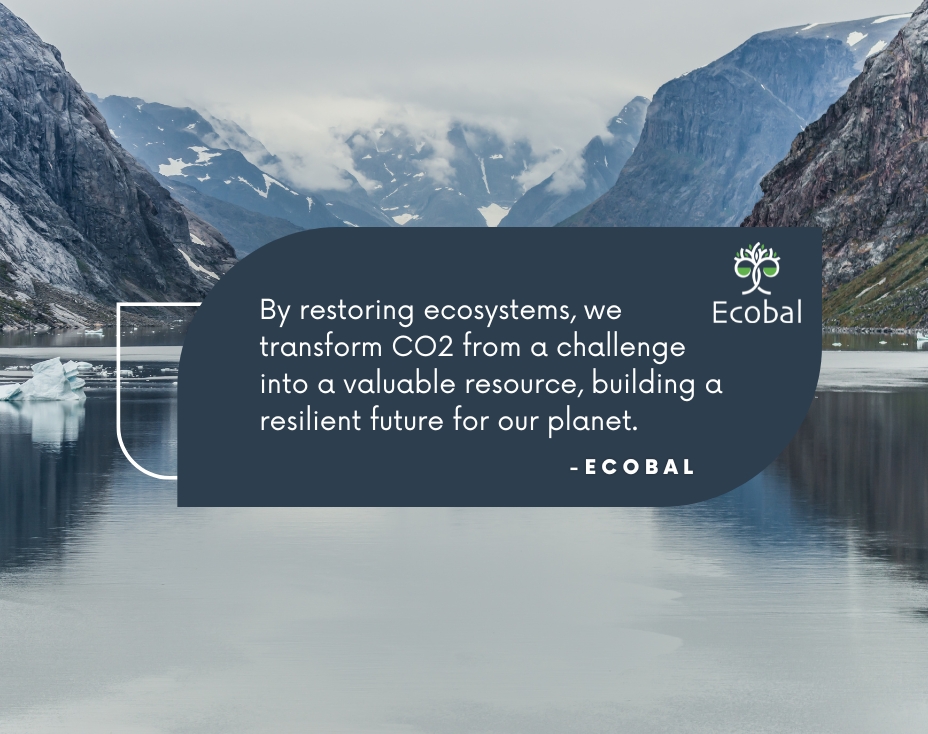Solutions to Address Greenland Ice Cap Melting: Ecobal’s Nature-Based Approach
In 2024, researchers observed a significant acceleration in the melting of Greenland’s ice sheet, with ice loss reaching approximately 30 million tons per hour. The latest data from NASA reveals that the Greenland ice sheet is shrinking 20% faster than previously estimated. This alarming rate is largely driven by rising global temperatures associated with increasing atmospheric greenhouse gases. As the ice melts, it contributes to rising sea levels, altering weather patterns and putting coastal ecosystems and human populations at risk.
At Ecobal, we believe the solution to these challenges lies in nature-based approaches. By restoring degraded ecosystems and sequestering CO2 and methane (CH4), we not only mitigate emissions but also create resilient ecosystems capable of withstanding future climate impacts.
The Growing Crisis: Greenland’s Ice Cap Melting
The Greenland ice sheet contains approximately 2.9 million gigatons (Gt) of ice, which equates to around 2.9 million billion tons. If the current melt rate of 30 million tons per hour continues, that’s about 720 million tons of ice lost per day—leading to an annual loss of 262.8 billion tons. While it would take over 11,000 years for the entire ice sheet to melt at this rate, these numbers highlight the growing concern over sea-level rise and its global impacts. Beyond the immediate concern of rising sea levels, the ongoing loss of ice threatens the balance of the Earth’s climate system.
Ecobal’s Nature-Based Solutions
At Ecobal, we take a solution-driven approach to tackling climate-related challenges such as Greenland’s ice cap melting. Our initiatives focus on restoring natural ecosystems, sequestering carbon, and enhancing biodiversity to combat climate change at its roots. Here’s how we contribute:
- Reforestation and Carbon Sequestration: Large-scale reforestation projects are a cornerstone of our efforts. Trees are powerful carbon sinks, capable of absorbing CO2 and storing it for generations. By restoring degraded lands, we contribute to long-term CO2 sequestration and support climate stabilization.
- Strengthening Climate Commitments: Our projects are aligned with international frameworks like the Paris Agreement, ensuring that the CO2 sequestered today will benefit future generations. We believe in the power of long-term, sustainable ecological interventions that extend beyond short-term gains.
- Advocating Sustainable Practices: Beyond ecosystem restoration, we advocate for energy efficiency and sustainable land management practices. These efforts, combined with promoting sustainable agriculture, ensure that we are addressing both carbon emissions and ecological health.
- Climate Adaptation and Resilience: By restoring ecosystems, we create natural buffers that protect communities from climate risks. Robust ecosystems—whether wetlands, forests, or grasslands—serve as critical buffers that absorb floodwaters, stabilize soils, and reduce the impact of extreme weather events.
Advancing Climate Science
In addition to our on-the-ground work, Ecobal collaborates with researchers and scientific institutions to advance the understanding of carbon sequestration and ecosystem restoration. Our projects are grounded in scientific rigor, drawing from the latest studies in environmental science to ensure maximum ecological and climate benefits. Ongoing research and field monitoring are integral to scaling our impact and improving our carbon sequestration processes.
Changing the Narrative: CO2 as a Valuable Resource
At Ecobal, we aim to shift the public perception of CO2 from being a purely detrimental factor to a valuable resource that can be stored in nature’s ecosystems. Through public awareness campaigns and educational initiatives, we encourage solution-driven actions to address climate change, rather than focusing on fear-based narratives. Our advocacy emphasizes that by restoring ecosystems, we are turning CO2 and CH4 into valuable assets that help build a resilient, sustainable future.
Why It Matters for Ecobal
Our projects go beyond planting trees—they focus on creating resilient ecosystems that can store CO2 and CH4 for future generations while enhancing biodiversity. Through nature-based solutions, Ecobal contributes to mitigating climate change, restoring balance in ecosystems, and supporting global climate goals like those outlined in the Paris Agreement.
Together, we can transform CO2 and CH4 from challenges into opportunities for a greener, more resilient world.
About the Author:
This article is written by Dr. Amsalu Milkias s, Ecobal’s CO2 Project Specialist. With a Ph.D. in Restoration Ecology, Dr. Amisalu leads efforts in carbon sequestration and ecosystem restoration. His research and fieldwork focus on innovative solutions to climate challenges, helping to drive Ecobal’s mission of building a sustainable future.


